Don’t Expect The Republican Field To Shrink Very Much Before Iowa
For a variety of reasons, it's unlikely that the Republican field will shrink significantly before the Iowa Caucuses.
The Hill’s Jonathan Easley makes some interesting points about how Donald Trump’s rise in the polls is being helped by the large size of the Republican field, and how his presence in the race likely means that the field will not shrink significantly in the near future:
The huge field of Republican presidential contenders is helping Donald Trump maintain a big lead in the race for the GOP presidential nomination — and Trump’s position makes it less likely candidates will drop out, Republicans say.
Buoyed by super-PACs, many presidential candidates have more money than in previous cycles to handle long campaigns. A single “sugar-daddy” donor can keep a struggling campaign afloat.
Many of the candidates also believe that Trump — who enjoys a double-digit lead over the 16 other big names in the race — will falter, and that they need to stay in the race to be his successor.
“As long as Trump is in the race, most of these candidates won’t see any reason to get out,” said Republican strategist Ford O’Connell.
Many Republicans still believe Trump will not become the party’s nominee. They argue that he’s benefitting from a media frenzy, and that large swaths of the conservative electorate would never even consider voting for him.
Furthermore, Republicans say Trump’s past support for liberal causes, and his penchant for controversial remarks, will ultimately sink him.
That line of thinking could keep many of the GOP contenders hanging around, seeking to peel voters from Trump’s substantial base of support in the case that he implodes.
However, Republicans say Trump will continue to benefit from having more than a dozen candidates splitting the vote behind him.
“It’s definitely a net plus for Trump that the field remains so large,” said Matt Mackowiak, a GOP strategist. “Support for the other candidates is completely fractured right now.”
Some in the party hope the field will winnow, potentially paving the way for a handful of what insiders have deemed “more electable” candidates to consolidate support and cut into Trump’s lead.
Political watchers expect a few bottom-dwellers will exit the race before the end of the year, but say there could still be a dozen candidates running deep into next March, when the debates finally wrap up and the contests turn from awarding delegates proportionally to winner-takes-all.
And with huge sums of money flowing into super-PACs, the candidates will have the financial means to stick around.
“In the past you’d get out because you run out of money. That’s changed,” O’Connell said. “Now you just need a small strike force of five or 10 people and enough money to book a coach ticket on Southwest. You can sit back and rely on the super-PAC to land the haymaker.”
Commentary’s Jonathan Tobin makes a similar point and explains some of the reasons why it’s unlikely that the GOP field will be winnowed any time soon:
Most of them, even the most obscure long shots that don’t seem to have the slightest chance of winning seem to have enough money in their coffers to continue their quixotic quests. This illustrates one of the many good points about the current much-maligned system. While most Americans don’t like the idea of the amount of money being spent on politics (even though the totals spent pale in comparison to the amounts expended on advertising campaigns for a host of products every year), the ruling does exactly what both the constitution and the court intended: allowing political speech to continue.
That’s why the sort of early winnowing of the presidential race that happened in 2012 that led a seemingly formidable candidate like Tim Pawlenty to drop out after a debate disaster probably won’t happen this time.
The Trump factor is probably also going to keep most of these candidates running up until Iowa and New Hampshire vote in February. If Trump weren’t running we might be getting a better idea of which of the candidates are making headway as the race sorted itself out with the moderates battling each other while those further to the right were competing for religious conservatives and Tea Partiers. But with Trump, a candidate who defies category or description sucking up most of the attention while also taking a solid 20-25 percent in the polls, there’s no way of knowing which of the contenders are really breaking out and which are fading.
The debates should be clarifying the identity of the real first tier contenders and, to some extent, that is already happening as Carly Fiorina’s post-debate seems likely to get her on the main stage when the CNN debate is held next month. But while the polls tell us something about the rising and falling fortunes of the candidates, as our John Podhoretz pointed out yesterday in the New York Post, our faith in the accuracy of political polls should have been shaken by recent disasters. The polls are, as he says, junk. That doesn’t mean that Trump isn’t currently leading but it does call into question whether we are overreacting to results in a 17-person field with most of the contenders in single digits with the differences between them all within the margin of error.
Thus, while many of those running have good reason to think they can’t win, there’s no definitive proof of it for most of them. Outside of a select few, most of the candidates — including Perry and Christie — knew the odds were stacked against them when they started. In a wide-open race, they were, in effect, doing nothing more than buying a lottery ticket with minimal chances of winning. But even that can’t be said of the likes of Lindsey Graham, George Pataki and Jim Gilmore, who would have to be insane to think they had even a theoretical chance of prevailing.
The analysis in both these pieces strikes me as largely correct. While it is certainly true that Donald Trump’s success in the polls is due in no small part to the fact that he is saying things that Republicans agree with, especially in areas such as immigration, and that Trump’s celebrity and abrasive style are popular with many people, it’s also rather obvious that he is benefiting from the fact that there is a crowded field of candidates. Even if you accept the fact that the twenty-five percent we’re seeing in the polling average is an accurate representation of Trump’s support among Republicans, that means that three-quarters of the Republican voters don’t support him. Now, possibly, some portion of this group could end up backing him later in the race, after all that’s typically what happens in every primary caucus. In Trump’s case, though, one gets the impression that there are a lot of people who are turned off by him and that Republicans who actually want to put forward a candidate that might have a chance of winning in 2016 are going to look at Trump and see someone likely to lead the party down the road to disaster. We saw the same thing happen in 2012 when polls were showing that Republican voters were backing candidates like Herman Cain, Michele Bachmann, Newt Gingrich, and Rick Santorum. In the end, they ended up voting for Mitt Romney who, will imperfect, was certainly a more credible General Election candidate than any of those people could have been. The same thing seems like it could happen this time around, although it is entirely possible that we could the GOP follow the path it took in 1964, or that Democrats took in 1972, 1984, and 1988, and nominate a candidate who has no real chance of winning the General Election. That choice, of course, could have profound implications further down the ballot.
Similarly, it now seems unlikely that we will see a significant winnowing of the Republican field before the caucuses begin in February. As Toobin notes, the fact that even many of the candidates who are at the bottom of polls seem to have sufficient resources to continue running at least some kind of bare bones operation for at least a short period of time. This is especially true given the fact that many of them can rely on help from SuperPACs and form free media time on local and cable news outlets eager for material to cover. Additionally, the fact that Trump is having such a unique impact on the rest of the race is likely to lead even some of the candidates at the bottom to stay in the race in anticipation of The Donald’s eventual downfall, which could lead to significant shakeup in the race if it happens. Of course, if it doesn’t then these people will be out of luck but there’s some logic in the reasoning behind staying in the race to wait out the resolution of the Trump phenomenon. Finally, the thing to remember about these polls is that, once you get passed Trump and Jeb Bush, the rest of the field is bunched very close together. In the current RealClearPolitics polling average, the different between Scott Walker’s fourth place and Chris Christie’s eleventh place is just four percentage points. That’s pretty much within the margin of error, and it suggests that the “Top Ten” ranking doesn’t really mean that much once you get past Trump and Bush, who are both averaging in double digits, and Ben Carson who is just below double digits. This suggests that even the candidates at the bottom of the back have an incentive to stay in the race to see if they can get the bump in the polls that would mean the difference between obscurity someone who is viewed as a potential contender.
None of this is to say that there will still be seventeen people in the race when we reach the Iowa Caucuses in February. It’s more likely than not that we’ll see at least some candidates face up to the same realities that candidates for the Presidency have had to deal with in the past such as lack of funds. Pretty much any of the candidates who are polling under 3-4% right now would be among those most likely to at least halt active campaigning at some point before the voting starts, especially once we reach the debates later this year that will not be issuing invitations to those who are polling at the bottom of the back at all rather than offering them a consolation debate. Additionally, we’ve already seen some signs of candidates who may be on the brink. Rick Perry has ceased paying his campaign staff nationwide because his fundraising has been so abysmal. Chris Christie has sunk in the polls since entering the race, finds himself likely to end up in the consolation debate in September, and has been the subject of rumors that his campaign may be ending sooner rather than later and of profile today in Politico that his campaign is “fading into darkness.” Rand Paul, meanwhile, faces disappointing fundraising, the issue of two top supporters having been indicted for campaign finance law violations related to his father’s 2012 campaign, and problems at home along with a general sense that his campaign has fizzled out. Paul could face a day of reckoning very soon depending on the outcome of today’s vote by the state GOP’s Central Committee on using a caucus to nominate its Senate candidate in 2016 rather than a primary. Paul needs a caucus in order to avoid running afoul of a state law that prohibits candidates from appearing on the ballot for two different offices at the same time.
All three of these candidates could survive a little while longer depending on their fundraising, but if the trends for each of them continue they way they have been going then they are really just delaying the inevitable. This is also true of candidates like Bobby Jindal, Rick Santorum, Lindsey Graham, George Pataki, and Jim Gilmore. If the past is any guide, I would expect to see most of these candidates at least suspend their campaigns by the end of the year unless they start moving up in the polls. However, this is not a typical year and while we may see some of these candidates drop out the dynamics of the campaign so far suggest that most of them will stay in the race, which will make things very interesting in Iowa and New Hampshire.
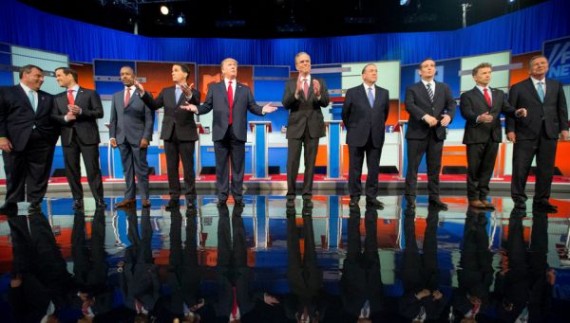

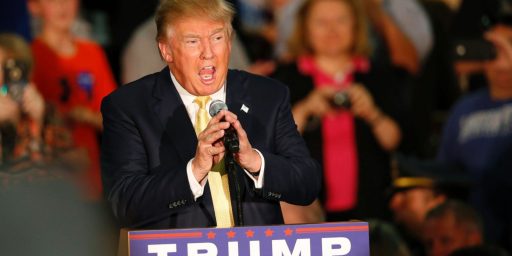
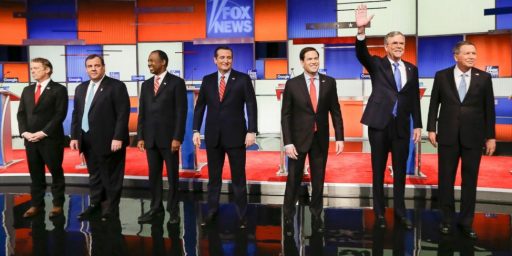
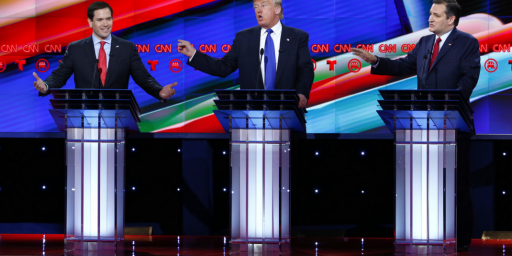
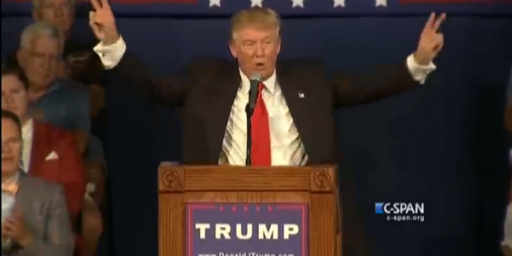
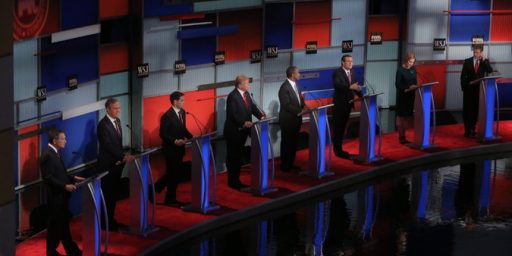
I’m not so sure. If Rand Paul does not get his caucus expect him to drop out next week to concentrate on his Senate race. The Perry campaign is on life support and the same can be said for Christi. Jendal will start looking for a job at a right wing “think tank” in the not to distance future.Gawd only knows why Graham is in the race at all..
Paul got his caucus. His campaign still has problems, but this should keep in the race for the long haul.
As for Perry, Christie and the others, as I said these candidates can afford to float along on a minimal budget for several months at the very least.
All of this is good news for the Democrats. The longer these 17 crabs in a bucket keep clawing at each other, the better-and also the more outlandish positions each candidate will take in order to win.
Jeb is going to sound like a cross between Barry Goldwater and George Wallace by Super Tuesday.
Sahara Steiner asks a good question – where can this 255K come from. Can it come from a PAC or does it need to come from Paul’s campaign fund?
Toobin says…
…and I threw up in my mouth a little bit. There is no way in hell the poo flinging that’s passing as political debate in the GOP primaries these days is exactly what the constitution intended.
I agree. I doubt that the Republican candidates can get much smaller.
Wow. You guys are so screwed.
And you did it to yourselves, too. I can’t even throw in a facetious “Thanks Obama!”.
@Scott F.: I don’t know. You’ve got two different things happening. There’s the large number of candidates talking, and there’s the fact that most of what they’re talking about isn’t issues. The former is good for the system. The latter is bad, and both the candidates and the press are to blame. If the Republican candidates knew what they were doing, this summer would have been dominated by talk of Planned Parenthood and the Iran treaty. Instead it’s been insults – no, not even that, it’s been talk about insults – and a little immigration. There’s not much a Fiorina or Jindal could do to elevate the debate either. The bigger the candidate, the more he could be doing to steer the campaign toward the issues. That doesn’t say much for Bush.